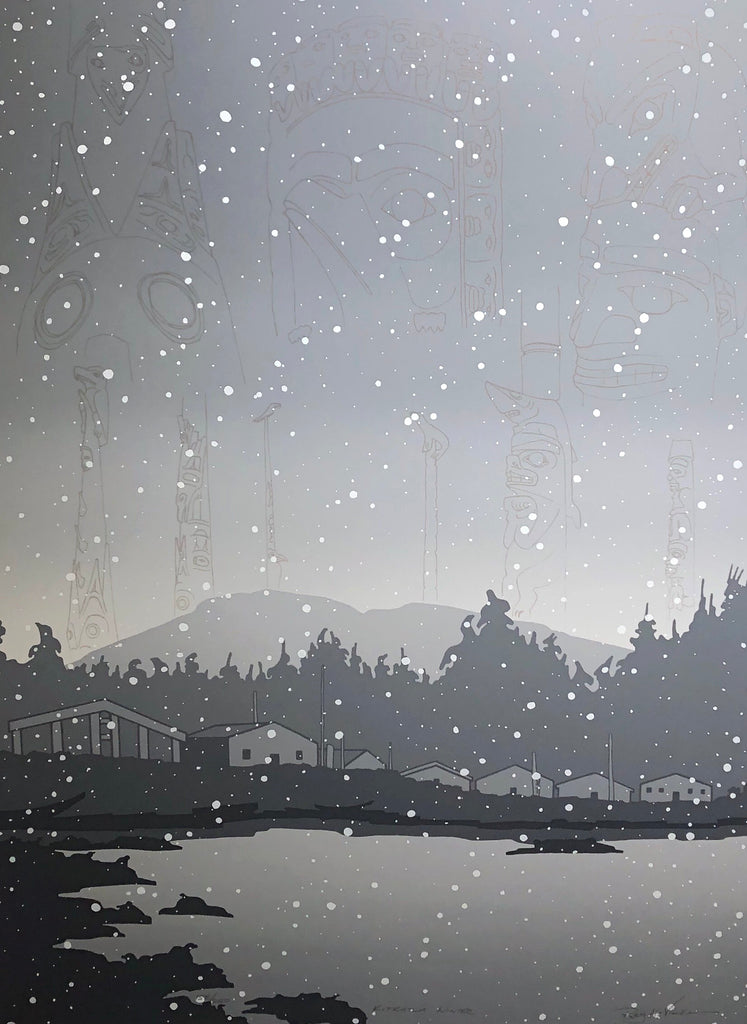$750.00
KITKATLA WINTER
Artist: Roy Henry Vickers
Medium: Serigraph
Image Size: 24" x 17 7/8"
Edition Size: 250
- Story
As a Lach Klan (Kitkatla) member, I am connected by a slim thread to an ancient culture. The Tsimshian culture was developed many centuries prior to European contact. The society that existed at the time of contact with Europeans was complex and sophisticated. The artistic expression of my ancestors was equal to any that has been in the history of man. The village of Kitkatla existed prior to the pyramids of Egypt and continues today in an unbroken habituation of some five thousand years or more. During my life, I have witnessed a cultural genocide and its effects on our modern-day civilization. The gradual erosion of traditional values - our spiritual, physical and intellectual relationship to our land. I remember the half dozen or so totems that still stood in the village of my childhood. I can still feel an emotional memory, the sense of community. I recall the sharing of meat by the hunters and fisherman, the first electric generator, oil stoves and heaters, the first social assistance or welfare cheques from the Department of Indian Affairs, food allowance, television and the time when aboriginals were first allowed to buy liquor, the breakdown of the family structure and a continuing legacy of abuse and rise of alcoholism. The generations of abuse have spawned a group of people who are dependent on a dominant culture and paternalistic Department of Indian Affairs. I see today a growing minority who have had enough of abuse and its effects. There is a growing number of people who are striving for and living in recovery. People who are facing the generations of co-dependence, who are reclaiming their identity, their sense of belonging, self-worth and freedom. Our long winter of discontent is over and, like the new life that comes each Spring, we are learning to live anew. We can live in the joy/pain of recovery. We will learn to be responsible for ourselves and our land. We are learning to be responsible in our inherent right to govern our destiny. We are realizing the tremendous wealth of human resource that we are as aboriginal people of Canada. We are becoming aware of the importance of our contribution to the world in which we live. These works of Kitkatla Winter and Kitkatla Spring are symbolic of no longer running from the past, but embracing it and being in the here and now. And so it is to move from Winter into Spring.
Story
As a Lach Klan (Kitkatla) member, I am connected by a slim thread to an ancient culture. The Tsimshian culture was developed many centuries prior to European contact. The society that existed at the time of contact with Europeans was complex and sophisticated. The artistic expression of my ancestors was equal to any that has been in the history of man. The village of Kitkatla existed prior to the pyramids of Egypt and continues today in an unbroken habituation of some five thousand years or more. During my life, I have witnessed a cultural genocide and its effects on our modern-day civilization. The gradual erosion of traditional values - our spiritual, physical and intellectual relationship to our land. I remember the half dozen or so totems that still stood in the village of my childhood. I can still feel an emotional memory, the sense of community. I recall the sharing of meat by the hunters and fisherman, the first electric generator, oil stoves and heaters, the first social assistance or welfare cheques from the Department of Indian Affairs, food allowance, television and the time when aboriginals were first allowed to buy liquor, the breakdown of the family structure and a continuing legacy of abuse and rise of alcoholism. The generations of abuse have spawned a group of people who are dependent on a dominant culture and paternalistic Department of Indian Affairs. I see today a growing minority who have had enough of abuse and its effects. There is a growing number of people who are striving for and living in recovery. People who are facing the generations of co-dependence, who are reclaiming their identity, their sense of belonging, self-worth and freedom. Our long winter of discontent is over and, like the new life that comes each Spring, we are learning to live anew. We can live in the joy/pain of recovery. We will learn to be responsible for ourselves and our land. We are learning to be responsible in our inherent right to govern our destiny. We are realizing the tremendous wealth of human resource that we are as aboriginal people of Canada. We are becoming aware of the importance of our contribution to the world in which we live. These works of Kitkatla Winter and Kitkatla Spring are symbolic of no longer running from the past, but embracing it and being in the here and now. And so it is to move from Winter into Spring.

